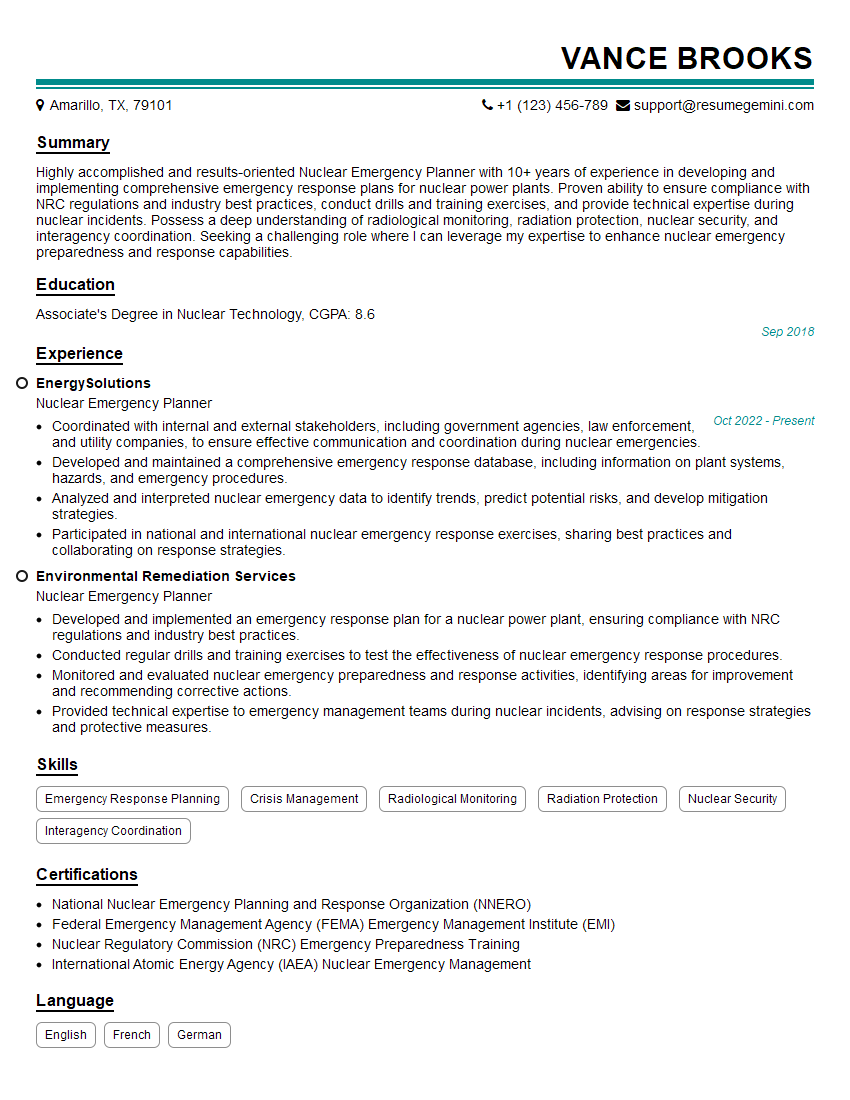Are you a seasoned Nuclear Emergency Planner seeking a new career path? Discover our professionally built Nuclear Emergency Planner Resume Template. This time-saving tool provides a solid foundation for your job search. Simply click “Edit Resume” to customize it with your unique experiences and achievements. Customize fonts and colors to match your personal style and increase your chances of landing your dream job. Explore more Resume Templates for additional options.

Vance Brooks
Nuclear Emergency Planner
Summary
Highly accomplished and results-oriented Nuclear Emergency Planner with 10+ years of experience in developing and implementing comprehensive emergency response plans for nuclear power plants. Proven ability to ensure compliance with NRC regulations and industry best practices, conduct drills and training exercises, and provide technical expertise during nuclear incidents. Possess a deep understanding of radiological monitoring, radiation protection, nuclear security, and interagency coordination. Seeking a challenging role where I can leverage my expertise to enhance nuclear emergency preparedness and response capabilities.
Education
Associate’s Degree in Nuclear Technology
September 2018
Skills
- Emergency Response Planning
- Crisis Management
- Radiological Monitoring
- Radiation Protection
- Nuclear Security
- Interagency Coordination
Work Experience
Nuclear Emergency Planner
- Coordinated with internal and external stakeholders, including government agencies, law enforcement, and utility companies, to ensure effective communication and coordination during nuclear emergencies.
- Developed and maintained a comprehensive emergency response database, including information on plant systems, hazards, and emergency procedures.
- Analyzed and interpreted nuclear emergency data to identify trends, predict potential risks, and develop mitigation strategies.
- Participated in national and international nuclear emergency response exercises, sharing best practices and collaborating on response strategies.
Nuclear Emergency Planner
- Developed and implemented an emergency response plan for a nuclear power plant, ensuring compliance with NRC regulations and industry best practices.
- Conducted regular drills and training exercises to test the effectiveness of nuclear emergency response procedures.
- Monitored and evaluated nuclear emergency preparedness and response activities, identifying areas for improvement and recommending corrective actions.
- Provided technical expertise to emergency management teams during nuclear incidents, advising on response strategies and protective measures.
Certificates
- National Nuclear Emergency Planning and Response Organization (NNERO)
- Federal Emergency Management Agency (FEMA) Emergency Management Institute (EMI)
- Nuclear Regulatory Commission (NRC) Emergency Preparedness Training
- International Atomic Energy Agency (IAEA) Nuclear Emergency Management
Languages
- English
- French
- German
Career Expert Tips:
- Select the ideal resume template to showcase your professional experience effectively.
- Master the art of resume writing to highlight your unique qualifications and achievements.
- Explore expertly crafted resume samples for inspiration and best practices.
- Build your best resume for free this new year with ResumeGemini. Enjoy exclusive discounts on ATS optimized resume templates.
How To Write Resume For Nuclear Emergency Planner
- Quantify your accomplishments whenever possible. Use specific numbers and metrics to demonstrate the impact of your work.
- Highlight your skills and experience in emergency response planning, crisis management, and radiological monitoring.
- Showcase your ability to work independently and as part of a team, and your strong communication and interpersonal skills.
- Tailor your resume to each job you apply for, highlighting the skills and experience that are most relevant to the position.
Essential Experience Highlights for a Strong Nuclear Emergency Planner Resume
- Developed and implemented emergency response plans for nuclear power plants, ensuring compliance with NRC regulations and industry best practices.
- Conducted regular drills and training exercises to test the effectiveness of nuclear emergency response procedures.
- Monitored and evaluated nuclear emergency preparedness and response activities, identifying areas for improvement and recommending corrective actions.
- Provided technical expertise to emergency management teams during nuclear incidents, advising on response strategies and protective measures.
- Coordinated with internal and external stakeholders, including government agencies, law enforcement, and utility companies, to ensure effective communication and coordination during nuclear emergencies.
Frequently Asked Questions (FAQ’s) For Nuclear Emergency Planner
What are the key responsibilities of a Nuclear Emergency Planner?
Nuclear Emergency Planners are responsible for developing, implementing, and maintaining comprehensive emergency response plans for nuclear power plants. They conduct drills and training exercises, monitor and evaluate emergency preparedness and response activities, and provide technical expertise during nuclear incidents.
What qualifications are required to become a Nuclear Emergency Planner?
Nuclear Emergency Planners typically hold an Associate’s Degree in Nuclear Technology or a related field, and have several years of experience in emergency response planning and management.
What are the career prospects for Nuclear Emergency Planners?
Nuclear Emergency Planners can advance to management positions, or specialize in areas such as radiological monitoring or radiation protection.
What are the challenges faced by Nuclear Emergency Planners?
Nuclear Emergency Planners face the challenge of ensuring that their plans are effective and up-to-date, and that emergency responders are prepared to respond to a nuclear incident.
What are the rewards of being a Nuclear Emergency Planner?
Nuclear Emergency Planners are responsible for protecting the public and the environment from the effects of a nuclear incident, and play a vital role in ensuring the safety of nuclear power plants.